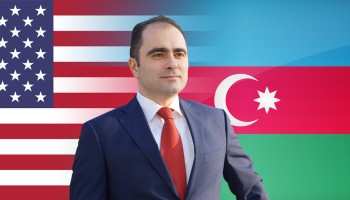The scheme was simple enough.
In May of 2013, the government of Azerbaijan, via its State Oil Company of Azerbaijan (SOCAR), injected $750,000 into an obscure Texas-based non-profit, the Assembly of the Friends of Azerbaijan (AFAZ).
The assembly then flipped the funds into a series of secondary non-profits – a constellation of US-based 501(c)(3) organizations scattered across America, all pushing Turkic interests.
A few weeks later, nine members of the US Congress touched down in Baku, Azerbaijan’s capital, flown and feted by those very funds. And it was quite a gathering: sumptuous dinners, fireworks displays, gifts of hand-woven carpets, crystal tea sets, silk scarves, and DVDs praising the country’s president—all free of charge, and costing well in excess of the permissible limits of gifts to Congress.
As the Washington Diplomat related, it was “among the biggest concentrations of American political star power ever seen in the Caucasus.”
It was also, according to a recent report from the US’s Office of Congressional Ethics (OCE), one of the most egregious ethics violations Washington has seen since the days of uber-lobbyist Jack Abramoff, whose rule-Flouting activities spurred the US’s last round of ethics reforms nearly a decade ago.
Per the OCE, the government of Azerbaijan and SOCAR appear to have secretly financed the junket for these nine lawmakers and dozens of staffers. And those scattered non-profits were but a group of middle-men, organizations who apparently deceived the House Ethics Committee repeatedly about the true sources of their funding.
But the debacle doesn’t end there.
The Ethics Committee is tasked with investigating lobbying and travel violations by members of the House of Representatives, and is made up of members of the House themselves. And despite being lied to by those pushing Azerbaijani interests, the committee has repeatedly stymied and stalled the OCE’s investigation.
The OCE, meanwhile, can only compile evidence from those willing to cooperate; its writ remains only as strong as the Ethics Committee’s willingness to enforce the rules. So when the Ethics Committee discounts—or abets—blatant abuses of a loophole, there is little the OCE can do.
“We haven’t seen this brazenness since the Abramoff days,” Craig Holman, a Congressional ethics expert with the Washington-based non-profit organization Public Citizen, said about the OCE’s report. “You’ve got a foreign government participating in trying to lie to the US Congress, and hoodwink the American public. … [And] the House Ethics Committee tried violating congressional rules and burying the OCE report.”
The report evokes the Abramoff scandal as it describes loopholes and organized deception, especially as it pertains to abusing 501(c)(3) organizations to suit lobbyists’ ends.
Abramoff, who served a jail term and has tried to redeem himself since his release by pushing for ethics reform, said in an email interview that the “practice of using non-profits to blur transparency for Congressional travel is not new, and is in fact something that I also did, unfortunately.”
Azerbaijan and SOCAR are not the only foreign entities to use non-profits to spend money on Congressional officials. The OCE report mentioned Turkish non-profits that cloaked their financial backers, much like Azerbaijan, and USA Today recently found an additional 200 Congressional trips secretly funded by dozens of Turkish groups since 2008.
It appears far more common that lobbyists tied to foreign interests exploit this US loophole, rather than the foreign governments themselves. For instance, a 2011 trip saw dozens of US lawmakers tour Israel thanks to a non-profit closely linked to AIPAC, the pro-Israel lobbying group.
Likewise, a 2009 trip to Liechtenstein and Germany was sponsored by a non-profit whose president, according to The New York Times, was a lobbyist. Even a 2011 trip to South Africa and Botswana, which focused on conservation and anti-poaching work, came through a non-profit with close ties to multiple lobbying organizations.
Azerbaijan has good reason to attempt to burnish its image. According to the Committee to Protect Journalists, Azerbaijan remains the fifth-most censored country in the world, and the country sits in the bottom third of Transparency International’s Corruption Perceptions Index.
PEN America recently bestowed the Freedom to Write award to OCCRP’s Khadija Ismayilova, Azerbaijan’s leading investigative journalist, who has been in prison for more than a year, with the BBC noting that “almost all outspoken government critics are now in prison.”
The country, according to the most recent estimates, has more than twice as many political prisoners as Russia and Belarus combined. And now, multiple Congressional officials are pushing to implement a sanctions regime against Azerbaijan’s leadership, paralleling the US’s Magnitsky Act tied to human rights abuses in Russia.
The OCE’s report “should result in a Department of Justice investigation and serious criminal penalties against SOCAR, if not the Azerbaijan government itself,” ethics expert Holman said. “I’ve been waiting for a scandal like this to happen again so we can go back to ethics committees and say, ‘Close your loopholes.’”
And yet, even though the OCE proved how easily Azerbaijan and its associates took advantage of the loopholes, there’s been little fallout. “This scandal has not captured the attention of the larger media outfits, at least to date,” Abramoff said. “Without a unified focus by the major networks, blogs, and papers, I don’t see this having legs.”
***
The OCE itself was a result of post-Abramoff reforms, an outgrowth of a House Ethics Committee unwilling to police its fellow members. After Abramoff’s schemes came to light, the House created the OCE, a semi-independent, non-partisan body tasked with urging the Ethics Committee to do its job. By one estimate, the Ethics Committee’s rate of disciplinary action has nearly doubled since the OCE emerged.
“The House Ethics Committee is often a puppy dog, rather than a watchdog,” says Daniel Schuman, policy director for the US-based Demand Progress. “If you’re looking for a success story on ethics, the OCE is that success story.” Since the OCE’s creation in 2008, it has helped the Ethics Committee with myriad investigations, conducting its own research and passing its findings to the committee, which then generally releases them to the public.
Although the relationship between the Ethics Committee and the OCE was initially rocky—and while Congress still routinely attempts to dial back the OCE’s reach—relations warmed over the past few Congressional sessions.
Now, though, the relationship is again troubled—and questions are being raised about the Ethics Committee’s objectivity and the effectiveness of the post-Abramoff reforms.
When the OCE initially began inquiring into the Azerbaijan trip in January 2015, the Ethics Committee lodged no complaints. Two months later, however, the committee demanded the OCE halt its investigation, and refer its evidence to the committee, a move known as “cease-and-refer.” The reason: the Ethics Committee said it was investigating the trip on its own.
The two bodies promptly split over an interpretation of the rules. According to ethics watchdog organizations, the Ethics Committee had failed to set up a required investigative subcommittee—which meant that the OCE could continue its investigation despite the committee’s complaints. “OCE rules are House rules,” Holman said. “The House Ethics Committee acted contrary to House rules.”
The OCE continued its work, sending final findings to the committee last May. But then the Ethics Committee chose not to publish them, claiming in July they couldn’t be released to the public due in part to prior leaks in the press. The committee also added that, while wrongdoing may have occurred during the trip, “evidence was inconclusive as to the true source of travel expenses for the House travelers.”
“The Committee on Ethics fully complied with House rules, and any suggestion to the contrary by individuals who have no knowledge of these rules is spurious,” the Ethics Committee said in a statement. It added that the committee “referred to the Department of Justice for possible prosecution individuals with some of the nonprofit sponsors who apparently lied to Congress.”
Yet the question remains: did the Ethics Committee try to quash the OCE’s investigation, and then conceal the OCE’s findings? There’s no clear answer, but a USA Today investigation found that Rep. Yvette Clarke (D-N.Y.), the lone member of the Ethics Committee who took the trip to Azerbaijan, did not follow the committee’s rules requiring advance approval of trips paid for by private groups.
That investigation noted that, for Clarke, “public files … do not include a pre-travel form at all.” Clarke “did not participate in the Committee’s proceedings,” according to the House Ethics Committee.
As troubling, an Open Secrets analysis found that House Ethics Committee Chairman Charlie Dent (R-Penn.) received at least $8,000 last May from “five individuals linked to the non-profit network” connected to Kemal Oksuz—the lead individual, according to the OCE’s findings, helping direct the non-profits’ deception in front of the House Ethics Committee about the funding to Azerbaijan.
According to a letter signed by watchdog organizations, the Ethics Committee’s actions were “unprecedented.” Furthermore, the committee could “establish a dangerous precedent that would allow the Ethics Committee to order the OCE, a supposedly independent body, to ‘cease and refer’ at any time” – allowing the Ethics Committee to kill any OCE investigation it doesn’t like.
After the Ethics Committee declined to release the findings, the OCE – which lacks Congressional subpoena power – released its report on its own website, citing “principles of transparency and accountability” and noting that numerous House members who traveled to Baku would not cooperate with the OCE’s investigation.
***
The report’s 76-page summary, along with thousands of pages of supporting documents, details how the government of Azerbaijan, SOCAR, and a handful of non-profits misled the Ethics Committee while treating American congressional officials to a lavish trip to Azerbaijan.
When a private entity finances a US Congressional trip, the real donors can be obscured by funneling funds through a 501(c)(3) non-profit organization. After SOCAR provided $750,000 to AFAZ, the non-profit paid for the trip via a network of secondary non-profits—all of whom made “willful and intentional misrepresentations” to the Ethics Committee, according to the OCE. The OCE’s report, initially spurred by a Houston Chronicle 2014 investigation, details dozens of maneuvers taken to obscure the source of funding.
“I suspect this type of laundering of funds to pay for congressional travel junkets happens uncomfortably often,” said Holman.
Meredith McGehee, policy director at the Campaign Legal Center, said of the Congressional loophole, “You’re just asking for trouble, kind of drawing a road-map for how to evade.” And as for the 2013 trip, “this wasn’t a case where someone just said, ‘Oops’—this was a lot of effort to make this happen.”
The junket appears to have paid dividends for Azerbaijan, which not only raised its profile, but boosted efforts to attract Western development for Caspian fuel extraction.
An additional Open Secrets investigation revealed that Rep. Jim Bridenstine (R-Okla.), who traveled to Baku, began stumping in Congress for Azerbaijani fuel, pushing an amendment “that would have required the Department of Defense to issue reports on the strategic importance of natural gas interests in the Caspian.”
Soon thereafter, six other Congressmen who had taken the trip to Baku attached their names to a House resolution seeking more access to Azerbaijan’s hydrocarbon reserves, despite the fact that some analysts say Azerbaijan plays an overblown role in Western energy security. And three other congressional members of the trip pushed for exemptions for Azerbaijan relating to the Iranian sanctions regime, clearing remaining obstacles to tapping Azerbaijani gas deposits.
Azerbaijan wasn’t the only country to exploit the lobbying loophole, but it may have been more blatant than most. When the head of one of the non-profits was asked if his funding statements before the Ethics Committee were untruthful, he said, “I mean, to be honest, it seems … like so, yes. I mean, we didn’t accept it maybe, but yes we did. What can I say?”
***
The investigation is now in the hands of the Department of Justice, which may or may not pursue a case. But the acrimony between the House Ethics Committee and the OCE will linger. “The House Ethics Committee hated this agency” during those first few years, said Holman. “It was this little agency that would tell them what to do, make them do their jobs. The House Ethics Committee just despised them.”
SOCAR—which “planned and organized significant portions of the Convention,” according to the OCE—has denied any wrongdoing, and the OCE found congressional officials acted in “good faith reliance on information received.”
Some of the congressional officials on the trip have claimed irritation at the deception: Rep. Michelle Lujan Grisham, (D-N.M.), was “blindsided,” according to the Albuquerque Free Press, while Rep. Leonard Lance (R-N.J.), said he was “furious, angry,” wrote the Lehigh Valley Live. That said, Rep. Gregory Meeks (D-N.Y.); Rep. Lance; Rep. Ted Poe, (R-Tex.); and Rep. Sheila Jackson Lee, (D-Tex.)—along with AFAZ—all refused to cooperate with the OCE’s review.
But beyond Azerbaijan’s lobbying practices—the country’s gained a notorious reputation for its oleaginous efforts in Washington—the OCE’s report may finally spur the reforms necessary to close, or at least shrink, the loopholes remaining for foreign travel in post-Abramoff Washington: Specifically, the 501(c)(3) dodge, and the lack of pressure on lawmakers to cooperate with OCE investigations.
“One of the really tough questions for [Speaker Paul Ryan] as well as the Democratic leader is, are they going to make clear to membership that they’re expected to cooperate with OCE?” McGehee says. A recent joint letter called for Ryan to “impose a moratorium on all privately-financed, foreign Congressional travel,” and set up a bipartisan task force to “recommend new rules and guidelines” that can prevent a similar violation in the future.
But the impetus for reform slips by the day. “Based on the OCE report, it certainly meets the ‘willful and knowing’ standard,” McGehee said. “The record is so clear, but I’m always …”—she sighs, slowly—“I don’t know; let down on these ethical issues.”







